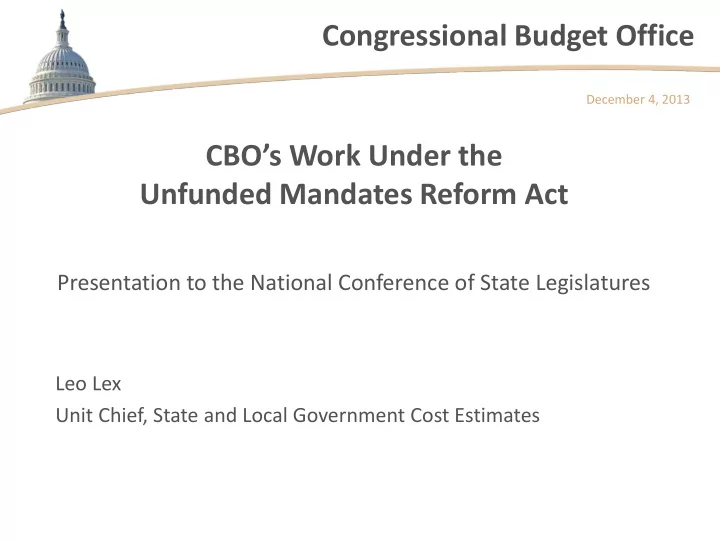

Congressional Budget Office December 4, 2013 CBO’s Work Under the Unfunded Mandates Reform Act Presentation to the National Conference of State Legislatures Leo Lex Unit Chief, State and Local Government Cost Estimates
CBO’s Role and Responsibilities ■ Provides nonpartisan analytical support to the Congress regarding budget and economic policy ■ Helps the Congress develop and implement its budget rules and procedures ■ Estimates the federal budgetary impact of legislation being considered by the Congress ■ Helps the Congress assess the impact of federal mandates 1 C O N G R E S S I O N A L B U D G E T O F F I C E
What CBO Does Not Do ■ Make policy recommendations ■ Write legislation ■ Implement programs and regulations and enforce budget rules ■ Audit spending or receipts 2 C O N G R E S S I O N A L B U D G E T O F F I C E
Federal Mandates ■ The Unfunded Mandates Reform Act of 1995 (UMRA) requires CBO to prepare analyses of federal mandates ■ CBO’s Budget Analysis Division identifies mandates in proposed legislation and estimates the costs that those mandates would impose on state, local, and tribal governments ■ CBO’s other divisions perform the same function for private-sector mandates 3 C O N G R E S S I O N A L B U D G E T O F F I C E
Identifying and Estimating Mandates ■ UMRA does not prohibit mandates ■ UMRA establishes procedures for providing information about mandates when bills are considered – Cost estimates – Committee reports ■ CBO’s cost estimates are guided by the definition of mandates in UMRA ■ Points of order may be raised by Members of Congress 4 C O N G R E S S I O N A L B U D G E T O F F I C E
Definitions ■ For something to be a mandate, it must be an enforceable duty that is not : – A condition of assistance – A condition for participating in a voluntary federal program ■ Preemptions of other governments’ authority are mandates 5 C O N G R E S S I O N A L B U D G E T O F F I C E
The Entitlement exception ■ Changes to large entitlement programs can be mandates if: – The change places new requirements on the program or – The change caps or decreases federal funding for the program – States lack programmatic flexibility to alter their responsibilities and continue providing required services 6 C O N G R E S S I O N A L B U D G E T O F F I C E
Special Cases ■ Reductions in authorized funding are mandates if the funding is for: – Complying with an existing mandate – Controlling borders ■ Otherwise, reductions in authorizations are not mandates ■ Actual reductions in appropriations are never mandates 7 C O N G R E S S I O N A L B U D G E T O F F I C E
Exclusions ■ Constitutional rights ■ Statutory rights ■ Accounting (auditing) ■ Emergency assistance ■ National security (treaties) ■ Presidentially designated emergencies ■ Social Security, Title II (OASDI) 8 C O N G R E S S I O N A L B U D G E T O F F I C E
Bills Containing Intergovernmental Mandates (Number) 9 C O N G R E S S I O N A L B U D G E T O F F I C E
Intergovernmental Mandates With Costs Over the Threshold ■ From 1996 through 2012, 18 intergovernmental mandates with costs over the threshold were enacted – Health care (5) – Child nutrition (2) – Internet taxation (2) – Rail and transit (2) – Minimum wage (2) – Child support (1) – Drivers ’ licenses and identification documents (1) – Food stamps (1) – Premium taxes for prescription plans (1) – Tax withholding (1) 10 C O N G R E S S I O N A L B U D G E T O F F I C E
Recommend
More recommend